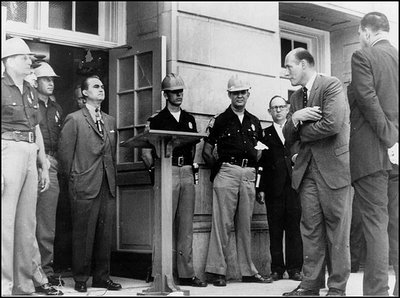“Everyone has a right to be stupid,” Trotsky said of the literary critic Dwight MacDonald. “But comrade MacDonald abuses the privilege.”
A viewer of the Chris Matthews MSNBC program “Hardball” might be forgiven for feeling the same way.
Matthews interviewed the party-switching former Republican of Rhode Island, Gov. Lincoln Chafee, the other day. Chafee said that the center of balance of the Republican Party has moved to the South. Matthews sputtered, “So Jefferson Davis didn’t win the war between the states–the Civil War if you will–but he did win the Republican party. This is weird.”
Weird is one word for it. Matthews would have us believe that Old Jeff Davis waited out the long Democratic dominance in the South in the latter half of the 19th century and most of the 20th century only to emerge and triumphantly take ownership of the GOP once it became successful in the region. How convenient.
In his defense, it must be said that Matthews wasn’t doing any original thinking. He was repeating a tired trope of the Left: that the purported Party of Lincoln is really the Party of Davis, Calhoun and Lee, that the Confederacy rides again in the contemporary GOP.
“Paradoxically,” the American Prospect has opined, “the party of Abraham Lincoln, which once saved the Union and which gives such passionate lip service to constitutionality, has come to embody the values of the Confederacy in its hostility to constitutional federalism and the civil bonds that the founding document codifies.” Jesse Jackson says Republicans “are in hock to their Southern, neo-Confederate base.” And on it goes.
I have just written a book about Abraham Lincoln in which I argue he’d be more comfortable with today’s conservatives than progressives, so I find this nonsense particularly perverse.
First of all, if winning in the South is such an offense, liberals should recoil from progressive heroes Woodrow Wilson and FDR, both of whom held a Solid South when it was deeply and institutionally racist.
Republicans began to win the South when it began to change. Republicans steadily gained strength there in the 1980s and 1990s at the same time that the region shed its racism. In fact, the party didn’t win more than half of congressional seats in the South until 1994, when Jim Crow was a distant memory and the Republican platform was the “Contract for America” that, needless to say, had nothing to do with race. In Alabama, the Republicans didn’t take over the state legislature for the first time since Reconstruction until 2010.
The Republicans are winning in a South that is diverse and attractive to immigrants; that honors civil rights; that is economically vibrant and features, in the likes of Houston, Charlotte, and Dalles-Ft. Worth, “the next wave of great American cities,” in the words of the urbanist Joel Kotkin; that is increasingly attractive to manufacturers.
In other words, they are winning in a South that exemplifies Lincoln’s life-long commitment to equality of opportunity and economic dynamism. In the grand sweep of the last century or so, this is the scorecard: the Democrats thrived in the South when it was backwards and bigoted relative to the rest of the country; the Republicans won it when it became vibrant and open. For this they are the party of Jefferson Davis?
The Left likes to fasten on Barry Goldwater’s opposition to the Civil Rights Act as the beginning of the GOP ascendance in the South. Ever since, the Republicans have allegedly won the region based on their implicit racism, as the de facto heirs of the segregationist George Wallace. It just isn’t so.
Political scientist Gerard Alexander has written persuasively in opposition to this charge. The Republicans made their first breakthrough in the South at the presidential level not in 1964, but in 1952. That’s when Dwight Eisenhower took states on the periphery of the South (Virginia, Florida, Tennessee, and Texas) and won over middle- and upper-income voters associated with the “New South.”
In 1964, Goldwater prevailed only in the states of the more racially polarized Deep South (and his native Arizona), but this was an exception that didn’t represent the pattern of the Republican growth in the region. Over the years, the party tended to overperform among transplants to the South and younger voters, both groups presumably with more tolerant racial views.
“In sum,” Alexander writes, “the GOP’s Southern electorate was not rural, nativist, less educated, afraid of change, or concentrated in the most stagnant parts of the Deep South. It was disproportionately suburban, middle-class, educated, younger, non-native-Southern, and concentrated in the growth-points that were, so to speak, the least ‘Southern’ parts of the South. This is a very strange way to reincarnate George Wallace’s movement.”
Or as Lincoln put it in a different context, the argument that Republicans stand exposed as neo-Confederates because they do well in South is “as thin as the homeopathic soup that was made by boiling the shadow of a pigeon that had starved to death.”
Rich Lowry, Editor at National Review, is the author of Lincoln Unbound: How an Ambitious Young Railsplitter Saved the American Dream–and How We Can Do It Again, on sale June 11 from Broadside Books, an imprint of HarperCollins.

COMMENTS
Please let us know if you're having issues with commenting.